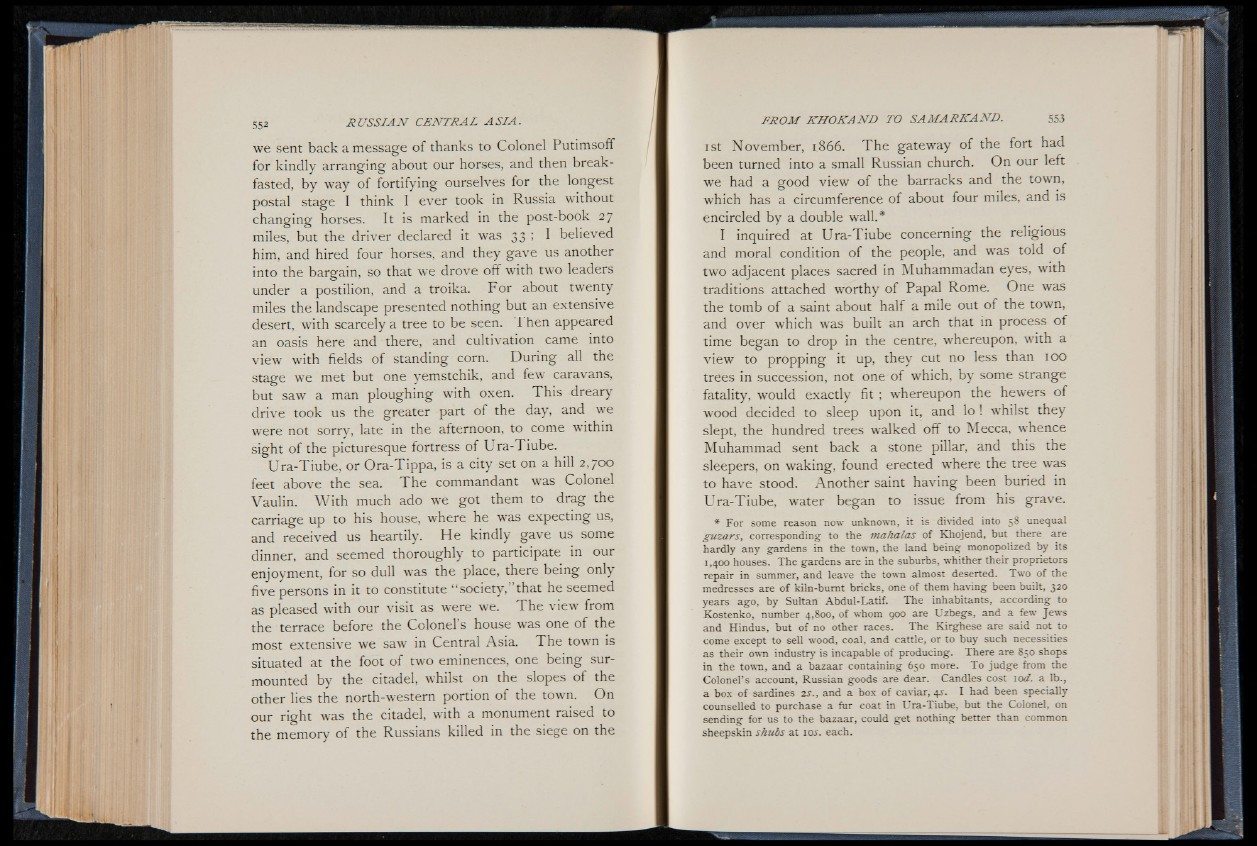
we sent back a message of thanks to Colonel Putimsoff
for kindly arranging about our horses, and then breakfasted,
by way of fortifying ourselves for the longest
postal stage I think I ever took in Russia without
changing horses. It is marked in the post-book 27
miles, but the driver declared it was 33 ; I believed
him, and hired four horses, and they gave us another
into the bargain, so that we drove off with two leaders
under a postilion, and a troika. For about twenty
miles the landscape presented nothing but an extensive
desert, with scarcely a tree to be seen. Then appeared
an oasis here and there, and cultivation came into
view with fields of standing corn. During all the
stage we met but one yemstchik, and few caravans,
but saw a man ploughing with oxen. This dreary
drive took us the greater part of the day, and we
were not sorry, late in the afternoon, to come within
sight of the picturesque fortress of Ura-Tiube.
Ura-Tiube, or Ora-Tippa, is a city set on a hill 2,700
feet above the sea. The commandant was Colonel
Vaulin. With much ado we got them to drag the
carriage up to his house, where he was expecting us,
and received us heartily. He kindly gave us some
dinner, and seemed thoroughly to participate in our
enjoyment, for so dull was the place, there being only
five persons in it to constitute “ society,’’that he seemed
as pleased with our visit as were we. The view from
the terrace before the Colonel’s house was one of the
most extensive we saw in Central Asia. The town is
situated at the foot of two eminences, one being surmounted
by the citadel, whilst on the slopes of the
other lies the north-western portion of the town. On
our right was the citadel, with a monument raised to
the memory of the Russians killed in the siege on the
ist November, 1866. The gateway of the fort had
been turned into a small Russian church. On our left
we had a good view of the barracks and the town,
which has a circumference of about four miles, and is
encircled by a double wall.*
I inquired at Ura-Tiube concerning the religious
and moral condition of the people, and was told of
two adjacent places sacred in Muhammadan eyes, with
traditions attached worthy of Papal Rome. One was
the tomb of a saint about half a mile out of the town,
and over which was built an arch that in process of
time began to drop in the centre, whereupon, with a
view to propping it up, they cut no less than 100
trees in succession, not one of which, by some strange
fatality, would exactly f i t ; whereupon the hewers of
wood decided to sleep upon it, and lo ! whilst they
slept, the hundred trees walked off to Mecca, whence
Muhammad sent back a stone pillar, and this the
sleepers, on waking, found erected where the tree was
to have stood. Another saint having been buried in
Ura-Tiube, water began to issue from his grave.
* For some reason now unknown, it is divided into 58 unequal
guzars, corresponding to the mahalas of Khojend, but there are
hardly any gardens in the town, the land being monopolized by its
1,400 houses. The gardens are in the suburbs, whither their proprietors
repair in summer, and leave the town almost deserted. Two o f the
medresses are of kiln-burnt bricks, one o f them having been built, 320
years ago, by Sultan Abdul-Latif. The inhabitants, according to
Kostenko, number 4,800, of whom 900 are Uzbegs, and a few Jews
and Hindus, but of no other races. The Kirghese are said not to
come except to sell wood, coal, and cattle, or to buy such necessities
as their own industry is incapable of producing. There are 850 shops
in the town, and a bazaar containing 650 more. To judg e from the
Colonel’ s account, Russian goods are dear. Candles cost 1 od. a lb.,
a box o f sardines 2s., and a box o f caviar, 4T. I had been specially
counselled to purchase a fur coat in Ura-Tiube, but the Colonel, on
sending for us to the bazaar, could g e t nothing better than common
sheepskin shubs a t ior. each.